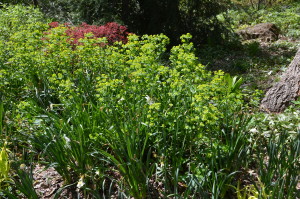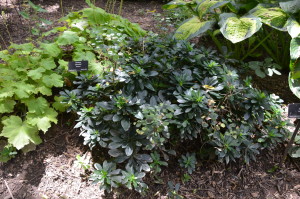I always been a fan of spurges, but some have not perform well in my garden. One that does not disappoint is Robb’s spurge (Euphorbia amygdaloides var. robbiae), aka “Mrs. Robb’s Bonnet”. This evergreen spurge grows equally well in either sun or shade, including dry shade (USDA hardiness zones 6-8).
This carefree slowly spreading groundcover displays shiny, dark green, leathery leaves. The vegetative clump grows 12-18 inches high. Robb’s spurge looks fantastic in either a pot and in the garden. In its northern range, it should be planted in a wind protected location for best winter foliage.
In very early spring the chartreuse flowers of Robb’s spurge unfurl in dramatic fashion, presenting 18-inch tall stalks of flowers last for months. By mid-spring the yellow green “flowers” are glorious. They are actually colored bracts which arise independently from the base of the plant in clusters. Bracts remain colorful long after the flowers have passed. Pruning cuts reveals the milky sap, which is usually poisonous. Deer and rabbits stay away, but you should also keep way from small children.
Euphorbias make up of one of the largest and most diverse plant families in the world. The milky sap of many herbaceous Euphorbia species have traditionally been used as a purgative or a laxative, hence the common name “spurge”.
Robb’s spurge is a carefree plant, almost too easy to grow. However, beware of what you ask for. Over time the clump spreads via rhizomes which is “containable”. It spreads quicker if the soil is moist and loose with organic matter. It tolerates more shade than most other Euphorbias.
Robb’s spurge is easily propagated by division or cuttings. Useful as a dry shade ground cover or along wooded paths interwoven with more ephemeral plants.



 Posted in
Posted in 
